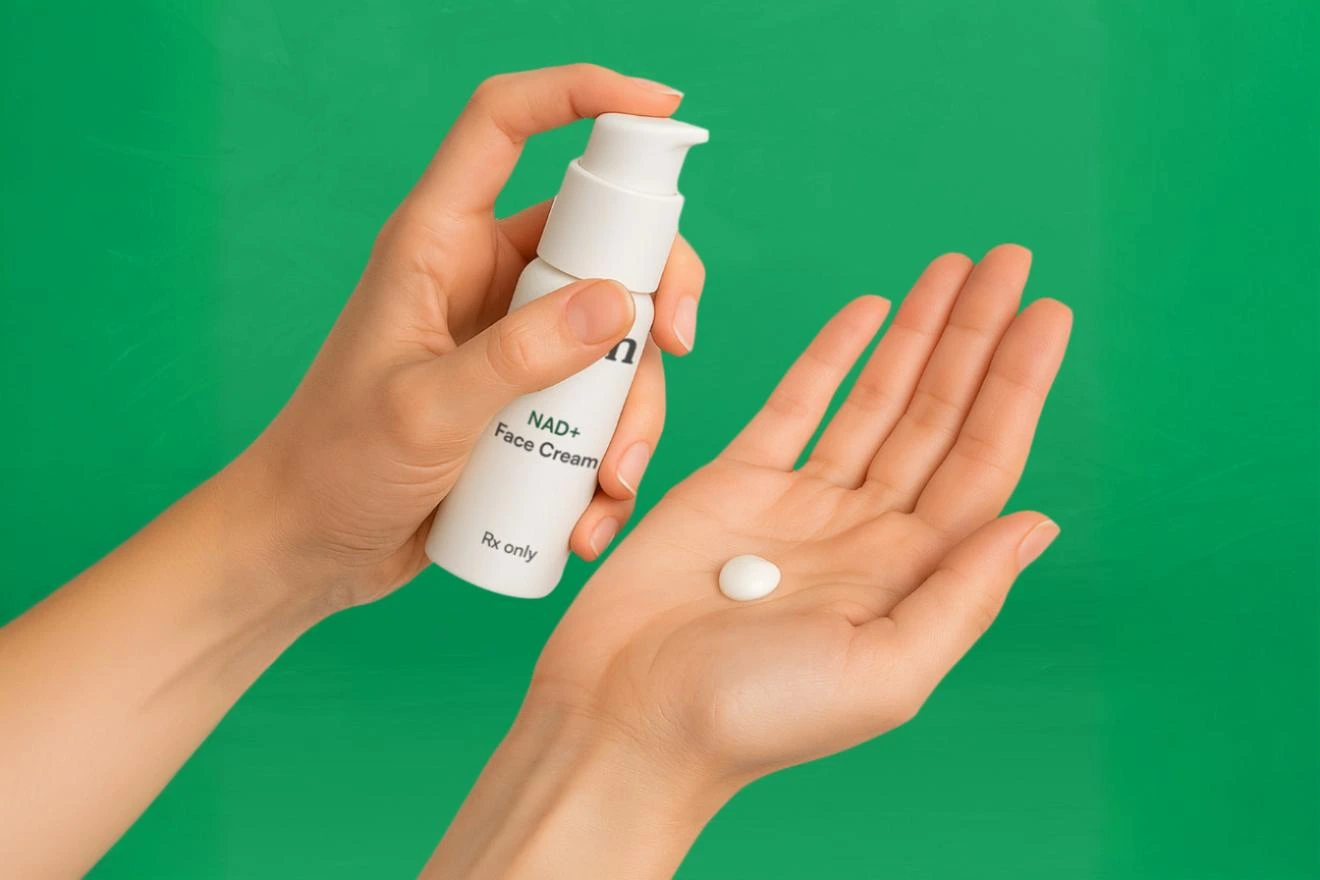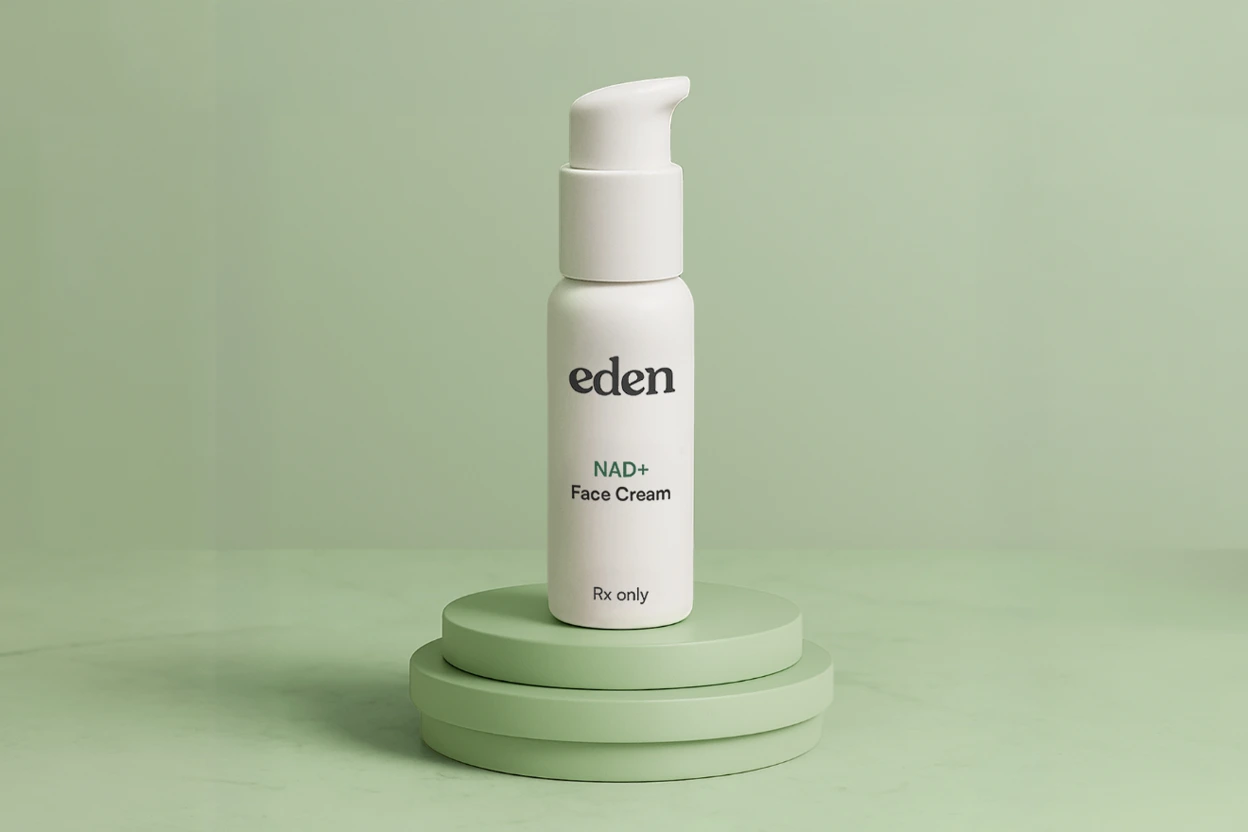Beyond Moisture: Why Cellular Repair Matters for Skin Aging
Explore how NAD+ face creams may support cellular repair to promote healthier-looking skin and resilience with age.
- Skin aging begins below the surface with cellular-level changes.
- NAD+ is a coenzyme that plays a role in energy production and cellular maintenance.
- NAD+ levels may decline with age, which can affect how skin looks and functions.
- NAD+-containing skincare products may help support the skin’s natural renewal processes.
- For optimal benefits, NAD+ creams should be part of a broader, well-structured skincare routine.
Most skincare products focus on the surface: hydration, smoothing, and brightening. While these benefits can enhance appearance, they may not address what’s happening deeper in the skin, at the cellular level. Aging begins inside the skin’s cells, where energy production and repair functions may naturally decline over time.
Emerging ingredients like NAD+ (nicotinamide adenine dinucleotide) are gaining interest for their potential to support skin at this foundational level. NAD+ is a coenzyme found in all cells and plays a role in energy production and repair mechanisms. Some advanced skincare products now incorporate topical NAD+ with the goal of supporting the skin’s natural functions beyond basic moisture.
This article explores why cellular repair matters in visible skin aging and how NAD+ creams may play a supportive role in your skincare routine.
How Skin Ages at the Cellular Level
Fine lines, dullness, and uneven texture are common signs of aging, but these are often the result of processes happening within skin cells. Several biological mechanisms may contribute to visible aging over time:
1. Reduced Cellular Energy
As skin ages, its ability to produce energy declines. This can slow down essential processes like cell turnover and collagen production, which may lead to decreased firmness and radiance.
2. Oxidative Stress
Environmental factors like UV exposure and pollution can contribute to oxidative stress. This can affect cellular components and may influence how skin responds to environmental challenges.
3. Less Efficient Repair
Skin naturally works to repair daily damage. With age, this repair process may become less efficient, potentially leading to changes in texture, tone, and elasticity.
Supporting skin at the cellular level may complement traditional surface treatments like moisturizers.
Surface Moisture vs Deeper Skin Support
Hydration is essential to maintain the skin’s barrier and prevent dryness. However, most common products focus on the outer layers of the skin and may not address internal cellular processes.
Common Moisturizing Ingredients:
- Emollients soften and smooth the skin
- Occlusives form a protective seal to prevent moisture loss
- Humectants draw moisture into the outer skin layers
These ingredients are valuable, but they don’t interact with the deeper processes that influence how skin regenerates and maintains its structure.
{{primary-cta}}
What Is NAD+?
Nicotinamide adenine dinucleotide (NAD+) is a coenzyme naturally present in all human cells. It plays a central role in:
- Supporting energy production in cells
- Helping regulate cellular maintenance pathways
- Assisting in the body’s defense against oxidative stress
- Supporting DNA stability and function
NAD+ levels may decline as part of the natural aging process, which can affect overall cellular performance, including that of skin cells.
How NAD+ Cream May Support Skin Function
When included in topical skincare formulations, NAD+ may offer several supportive functions. While individual results vary, some users include NAD+-infused creams in their routines for the following reasons:
1. May Support Cellular Energy Levels
NAD+ plays a role in mitochondrial function, which is central to how cells generate energy. Supporting this process may contribute to healthy skin renewal.
2. May Help Skin Respond to Environmental Stress
NAD+ is associated with pathways that respond to oxidative stress. Topical products may support the skin’s natural defenses against environmental stressors like UV rays and pollution.
3. May Complement the Skin’s Repair Functions
As the skin ages, its ability to maintain and renew itself changes. NAD+ is involved in regulating enzymes that participate in repair pathways, and topical application may help reinforce these natural processes.
Choosing a Quality NAD+ Face Cream
Effectiveness depends not just on the ingredient but also on the product’s formulation and delivery system. Look for these qualities:
1. Stable Packaging
NAD+ is sensitive to light and air. Choose products stored in opaque, air-tight containers to help maintain potency.
2. Complementary Ingredients
Many high-quality NAD+ creams also include:
- Niacinamide – supports skin tone and may help preserve moisture
- Hyaluronic Acid – provides hydration by attracting moisture to the skin
- Squalane or Ceramides – help strengthen the skin’s lipid barrier
- Peptides – may assist with skin firmness and appearance
3. Transparent Ingredient Labeling
Check the label for NAD+, NADH, or NAD+ precursors. Choose products that clearly indicate their active ingredients without vague claims.
How to Use NAD+ Cream in Your Skincare Routine
NAD+ creams are not designed to replace other skincare steps but to complement them. Here's how to include NAD+ cream in a balanced regimen:
- Cleanse: Start with a gentle cleanser.
- Tone (optional): Balance the skin’s pH with a toner if desired.
- Apply NAD+ Cream: Use once or twice daily according to product instructions.
- Moisturize: Follow with a barrier-reinforcing moisturizer.
- SPF Protection: Use a broad-spectrum sunscreen during the day.
Consistency is key for any skincare routine to deliver results over time.
Who Might Consider NAD+ Cream?
NAD+ creams may be suitable for individuals who are:
- Beginning to notice changes in skin tone or texture
- Exposed regularly to environmental stressors like sun and pollution
- Interested in supporting their skin’s natural maintenance functions
- Looking for skincare products that incorporate emerging scientific ingredients
Always consult with a licensed skincare professional before starting a new regimen.
{{primary-cta}}
Conclusion: Supporting Skin from the Inside Out
While hydration remains a cornerstone of skincare, deeper support is essential for anyone focused on long-term skin health. By including ingredients like NAD+, modern skincare routines may support the skin’s natural processes, including energy balance and response to daily stress.
For individuals seeking a more advanced and science-backed approach to skin support, NAD+-containing products offer a promising addition to a comprehensive routine.
Disclaimer
Please note that NAD+ face cream is not reviewed or approved by the FDA for cosmetic or therapeutic use. This content is for educational purposes only and does not constitute medical advice. Always consult a licensed healthcare provider. Eden is not a medical provider or a pharmacy. Eden connects individuals with independent licensed healthcare providers who independently evaluate each patient to determine whether a prescription treatment program is appropriate. All prescriptions are written at the sole discretion of the licensed provider. Medications are filled by independent, state-licensed pharmacies. Eden does not manufacture, own, or dispense any medications. No health claims are made unless supported by multiple peer-reviewed studies. Please consult a licensed healthcare provider before making any medical decisions.
Disclaimer: The FDA does not approve compounded medications for safety, quality, or manufacturing. Prescriptions and a medical evaluation are required for certain products. The information provided on this blog is for general informational purposes only. It is not intended as a substitute for professional advice from a qualified healthcare professional and should not be relied upon as personal health advice. The information contained in this blog is not meant to diagnose, treat, cure, or prevent any disease. Readers are advised to consult with a qualified healthcare professional for any medical concerns, including side effects. Use of this blog's information is at your own risk. The blog owner is not responsible for any adverse effects or consequences resulting from the use of any suggestions or information provided in this blog.
Eden is not a medical provider. Eden connects individuals with independent licensed healthcare providers who independently evaluate each patient to determine whether a prescription treatment program is appropriate. All prescriptions are written at the sole discretion of the licensed provider. Medications are filled by state-licensed pharmacies. Please consult a licensed healthcare provider before making any medical decisions.
Frequently asked questions
Blog Components



References
The wellness insight you need, without the noise.




















